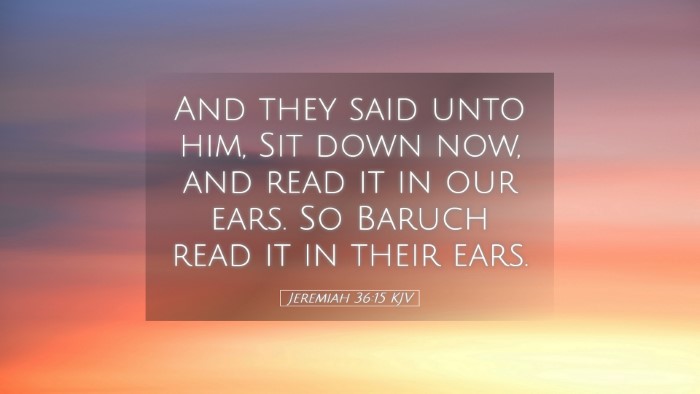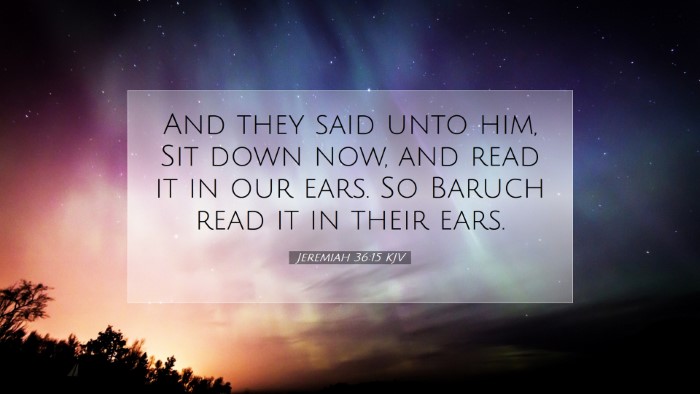Commentary on Jeremiah 36:15
Verse: Jeremiah 36:15 - “And they said unto him, Sit down now, and read it in our ears. So Baruch read it in their ears.”
Introduction
Jeremiah 36:15 marks a significant moment in the prophetic ministry of Jeremiah and the role of Baruch as his scribe. The verse describes an instance where the leaders of Judah, responding to the public reading of God's words, demonstrate a curiosity to hear the message that God had delivered through His prophet. This commentary synthesizes insights from historic public domain sources to unpack the theological, historical, and practical implications of this verse.
Contextual Background
Jeremiah's ministry took place during a turbulent period in Judah's history, marked by political unrest and impending judgment. The reading of the scroll prepared by Baruch, under Jeremiah's dictation, served as a declaration of God's impending judgment against Jerusalem for its sins. Understanding the historical backdrop is crucial for comprehending the urgency and gravity of this moment.
Exegesis of Key Phrases
- “Sit down now”: This directive reflects a posture of receptiveness and readiness among the leaders. It indicates their willingness to engage with the Word of God being presented.
- “Read it in our ears”: The act of reading aloud suggests a communal aspect of Scripture engagement, emphasizing the importance of shared experiences in understanding God's revelation.
- “So Baruch read it”: Baruch's role is pivotal; as a scribe, he serves not merely as a transmitter of the text but as an active participant in God's communicative process.
Theological Insights
Divine Communication: The insistence of the leaders to hear the scroll is indicative of a moment where divine authority intersects with human inquiry. Albert Barnes notes that the eager listening signifies a recognition of the divine origin of the message. They are acknowledging the seriousness of the prophetic pronouncements.
Human Response to Divine Revelation: The response of the leaders can be seen as a typology of how individuals and communities are called to respond to God’s Word. Adam Clarke emphasizes that listening is an act of humility and submission. The leaders’ approach prompts reflection on the necessity of humility when engaging with the sacred texts.
Historical Interpretation
Matthew Henry contextualizes this reading in the broader narrative of Israel's history, interpreting it as a moment of opportunity for repentance. Henry argues that the desire of the leaders to hear indicates a divine invitation to reconsider their path and the consequences of their actions. There is an implicit call to leadership here: true leaders seek the truth and align themselves with God's purposes.
Applications for Today's Believers
- Listening to God’s Voice: Just as the leaders sought to hear the message, modern believers are encouraged to actively seek out the voice of God in Scripture, listening attentively to His word in devotional practices.
- Community Engagement with Scripture: The act of communal listening invites church communities to gather around God's Word, fostering an environment where collective discernment occurs.
- Leadership and Responsibility: Leaders today are reminded of the weighty responsibility they bear in guiding others in exploring God's message, echoing Baruch's role as a facilitator of divine revelation.
Conclusion
The brief yet powerful moment captured in Jeremiah 36:15 reveals profound insights about the nature of divine communication and human response. It beckons pastors, theologians, and all students of the Word to reflect on their own receptivity to God's messages and the communal dimensions of Scripture engagement. The earnestness with which the leaders desire to hear the scroll invites a continued commitment to pursue God through His Word, fostering a renewed sense of urgency for contemporary believers to not only hear but also to embody God's revelations in their lives.


